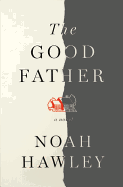
Noah Hawley's fourth novel, The Good Father, mingles psychodrama and political intrigue in a story that raises questions about the scope of parental responsibility. When an adult child's life takes a horribly wrong turn, how much is the parent at fault? Can a parent have too much blind faith in a child--and can that "blind faith" be a willful blindness to the parent's own failings?
Dr. Paul Allen's eldest son, Daniel--the child of his first marriage, which has been over for 13 years--dropped out of college months ago. Although his phone calls have been infrequent and his whereabouts uncertain since then, Paul wants to believe he's doing okay. But then a TV news report shows Daniel being captured by Secret Service agents after a presidential candidate is shot--and Daniel makes a full confession not long after. Paul can't believe that Daniel actually committed this act; his intense search for the truth begins to undermine his second family and his own sense of self.
Although Paul's efforts to comprehend the incomprehensible are what drive the story, the mysteries of The Good Father are psychological rather than plot-driven, as Hawley roots out emotional truths in a father's struggle for acceptance and a son's misdirected search for identity. At the same time, Hawley's background in TV crime drama (including Bones) contributes to well-paced storytelling that never gets bogged down in its complex emotional underpinnings. --Florinda Pendley Vasquez, blogger at The 3 R's Blog: Reading, 'Riting, and Randomness

